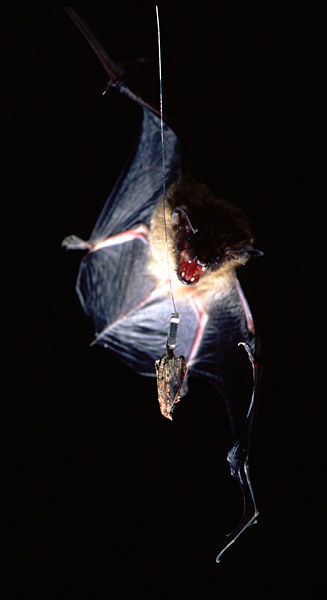Scientists have have found that a bar magnet is the basis of bats' direction-finding prowess.
 University of Leeds researcher Richard Holland and his colleagues exposed big brown bats (Eptesicus fuscus), which are renowed navigators, to a magnetic pulse 5000 times stronger that the Earth's own magnetic field.
University of Leeds researcher Richard Holland and his colleagues exposed big brown bats (Eptesicus fuscus), which are renowed navigators, to a magnetic pulse 5000 times stronger that the Earth's own magnetic field.
One group of the bats received a pulse aligned with the planet's field. The intention was that these animals would serve as a control to rule out any behavioural side effects caused by exposure to the magnetic pulse. The second group of animals received a pulse oriented in the opposite direction to the Earth's field, and the third group received no pulse at all.
The bats were then released 20 km north of their usual roosting sites and tracked with radio transmitters as they tried to find their way home. As expected the unmagnetised and the control animals all set off in the right direction, but about half of the animals that received the reverse-direction pulse initially flew off in totally the wrong direction.
This, say the researchers, suggests that the animals are using a neurological compass based on a magnetic iron compound called magnetite (Fe3O4). Crystals of the compound form small grains like miniature bar magnets which will swing around as the animal changes its position relative the the Earth's magnetic field. But a strong magnetic pulse like that used in the present experiment can reverse the poles of the magnetite compass, causing the animal to confuse north with south.
The team base their argument on observations from certain types of bacteria which naturally seek out magnetic north or south poles. These "magnetotacts", which also produce small magnetite crystals inside their cells, can also be converted from north-seeking to south-seeking forms by exposure to magnetic pulses.
But why did only half of the magnetised bats fly off in the wrong direction? The answer, the team suggests, is because they were testing the animals in their home territory and some of them could well have realised where they were using other cues, such as sight or smell, and this over-rode their flawed sense of direction.










Comments
Add a comment